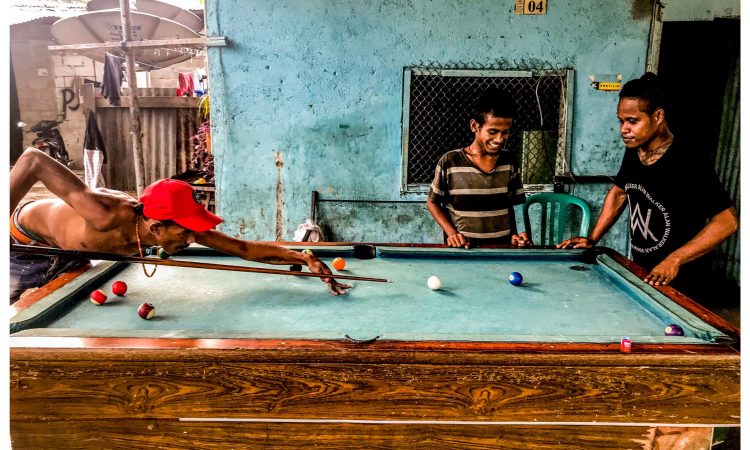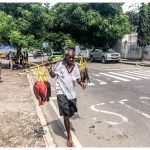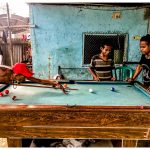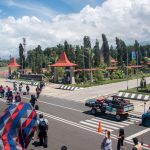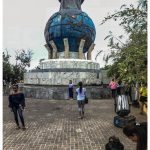Fast facts East Timor:
- Portuguese colony 16th Century -> 1975
- When the Portuguese left the Indonesian army rolled in announcing it a new Indonesian province. Indonesia was then backed by Australia, US and GB who were fearing that the alternative would be a communist independent state.
- East Timor however wanted independence and from their mountain bases freedom fighters / guerilla forces fought for independence.
- Indonesia pulled out in 1999. Just before they left they ruined much of the country and went on a killing spree. It is estimated between 100-180.000 people were killed under Indonesian rule btw. 1975-1999.
- A 1999 referendum showed that a clear majority of the population backed independence.
- A transitional UN government ruled from 1999-2002.
- East Timor became an independent country and a UN-member in 2002.
- The official name of the country is Timor Leste. Timor means “East” in Malay (the Portuguese took the name from “Timur” the Malasian name of the island). Leste means “East” in Portuguese – hence the name of the country literally is “East East”.
- The fourth Prime Minister (formerly the first president) Xanana Gusmão writes poetry and has a background as freedom fighter – hence he is nick named “The poet warrior”.
- Elections will be held this summer in East Timor. Everything has now allegedly come to a deadlock since no party has absolute majority and almost every decision seems to await the election.
- The population is predominately Christian and the main language is Tetum. Some speak Portuguese (mainly around the Capital Dili). Many other local languages are also spoken.
Unfortunately, I only had 3 days / 2 nights in East Timor. Way too little. So, I had to limit myself to the capital Dili. I went straight to “Da Terra Hostal” in the city center. “Da Terra” is where all backpackers in East Timor seem to meet. I often find that it is in the countries not visited by many you meet the coolest travelers. The hostel is one of those places you used to find everywhere in South East Asia but now they are few and far between. Dormitory accommodation, no locks on the door, communal dinners at night, movie nights etc. Most importantly it is a place where people are actually talking to each other instead of only monitoring their phones (no wifi available except for local data-enabled sim-card holders).
On my first night I am invited to an expat dinner at a local restaurant (with the friends of the friendly Portuguese/Indonesian couple who run the hostel). It is rainy season and every evening and night it rains heavily. Also present is Nuno from Portugal who looks just like Mr. Bean (so much that he is sometimes stopped in the street and asked for autographs) and two Portuguese guys (Thomas and André) and André’s Mexican girlfriend. The latter three are all employed by the Heineken brewery (that owns local brewery Bintang that they are working for). They tell me a bit about their challenges working with the locals who sound neither very organized, well-educated or responsible.
It is the night of carnival according to the catholic calendar and Nuno wants to go to a carnival party (Here that means a party where you yourself dress up not a traditional carnival parade). I am dying to go but it is raining, everyone else has to work tomorrow, I didn’t bring a costume in my carry on only luggage and Nuno is drunk and tired. So unfortunately, we miss that.
The next day I meet Wally from Brazil (ladies watch out) and Richard from Nottingham. Richard runs the (super cool) travel blog named “Travel-Tramp” focusing on off the beaten track destinations. Richard and Wally have just been self-driving around the island on motorbikes for a week. They tell me that one night they arrived late in a mountain village and couldn’t find lodging. An old lady then offered them to sleep on the floor. However, in a mountain village word of new folks in town spreads like the wind and soon after the telephone rang at the old lady’s house. A man speaking Portuguese got Wally (also speaking Portuguese) on the phone and invited them to stay at his place. He turned out to have been a freedom fighter who through all the 24 years of the resistance (1975-1999) fought the Indonesians from his base in the mountains. In that period, he lost “about half of his friends”. And the first thing on the agenda on their meetings every morning was “how can we kill some Indonesians today”. After the first 4 years of war his wife unfortunately was captured. She was held imprisoned for the next 20 years (!) until the war ended and she was released. Today the couple are happily married with three kids (conceived after the imprisonment of course) and now they are trying to start a little guesthouse in the village. On the wall in his house hangs a photo of him pressing the hand of the presidents and until he gets his guesthouse up and running he survives on his military pension allowance. (for full story please refer to Travel-Tramp website).
After having been told this very interesting story I explore Dili a bit myself. I take a “Microlet” number 10 towards the fruit market. From there I have been told to take another Microlet – this time a number 12 – to reach the Christo Rei – the huge Christ statue looming over the coast 7 km south of Dili. A “Microlet” is a small and crammed local city bus. Inside benches are narrow and uncomfortable and the cabin is so low that anyone taller than 1m60cm cannot sit up straight. The windscreen is covered in foil making it almost impossible for the driver to see anything and from under the seats decaying loudspeakers pump out Brazilian rhythms. The volume corresponds to that of a major stadium concert even though we are confined to an area of just a few square meters. Each trip costs 25 Centavos (equals 25 US cents since the currency is pegged to USD).
Changing from Microlet number 10 to number 12 proves far from easy since it is a public holiday and every single citizen of Dili seems to be heading towards Christo Rei and the nearby beaches. Hence the first four number 12 Microlets are crammed beyond imagination (additionally each of them has four people standing in the door – their bodies completely outside the vehicle). They all ignore the white Danish tourist trying to flag them down.
In the end I jump in a taxi. For 3 USD Adi takes me to my destination. He seems almost too young to be allowed to drive. Maybe he is around 18 years old. “Hi kollega dirkolej” I say when I enter his car since Lucy at my hostel has told me that this means “Hello my friend how are you” in his native language (Tetum). His car looks cool with no less than 6 extra rear-view mirrors fitted on the inside of the windscreen. I have just started photographing the many mirrors with my iPhone when Adi says: “I can get girls that you can take to your apartment. They are from 11-6 to 11-1 years”. I am totally appalled. I am pretty sure he means girls between 11 and 16 years of age. So, I press the video record button on my iPhone and let him repeat his preposterous offer on camera (see video).
The view from the “Christo Rei” is amazing and divert my thoughts from the horrible taxi driver. I can see beach on both sides of majestic mountains. Both beaches are packed with happy locals enjoying their holiday. Two other “Microlets” take me home after my little excursion comes to an end (see video from one of them). On our way we pass a Check Point and suddenly the music is turned down and everyone quickly needs to be squeezed in on the benches and sit down inside the car. I return to my excellent “Da Terra Hostal” and celebrate my country number 185 with a glass of passion fruit juice and a beer in the pleasant company of hardcore travelers.
Click here for Dili taxidriver offering (way too) young girls:

